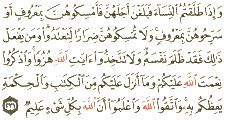|
231. " when you divorce women, and they have reached their
waiting-period, then either retain them in a fair manner or set them free
in a fair manner; and do not retain them for injury,
so that you transgress (the limits); and whoever does that he indeed is
unjust to his (own) self. and do not take allah's signs in mockery,
and remember allah's blessing upon you and what he has sent down unto
you of the book and wisdom to admonish you thereby,
and be in awe of allah and know that
allah is all-knowing of all things."
commentary:
this verse, following the subject of the previous verse, states some
limits that islam has legislated upon divorce in order to prevent some
disregards unto the rights and honour of women.
the verse indicates that during the waiting-period, even if there is
only one day remained from that term, man is allowed to return to his
wife and retain her with the purpose of living together sincerely. but, if
the circumstances are not favourable, he can set her free. at any rate,
whatever his decision is: either revocation or separation, it should be
fulfilled in a fair manner and with goodness and, consequently, far from
any revengefulness.
" when you divorce women, and they have reached their
waiting-period, then either retain them in a fair manner or
set them free in a fair manner; ..."
then the verse interprets the qur'anic term /ma`ruf/ (a fair
manner) saying that the revocation should be based on serenity and
sincerity.
"...do not retain them for injury,
so that you transgress (the limits); and whoever does that
he indeed is unjust to his (own) self. ..."
since, at the age of ignorance, divorce and revocation had often
been used as a means of injury and avengefulness, the verse, with a
severe tone, says that retaining a woman as one's wife should not be
performed with the aim of hurting her or transgressing her, because this
manner is not only unjust against her but also unjust to his own self.
this meaning may be for the sake that:
1- the revocation which is based on the purpose of transgression
contains no tranquility and peace with it.
2- from the view point of the qur'an, in the system of creation,
man and woman are complementary parts of one unit. so, for a
husband treading the rights of his wife is a transgression and injustice to
his own self.
3- the one who acts unjustly against another person he, indeed,
goes forward unto the punishment of allah and, thus, he has done
cruelty to himself, in fact.
mock not allah's laws:
some people usually commit thousands of offences, but, to fly
from the pressure of their inner sense or, as they imagine, to fly from
the chastisement of allah, they seek protection of some legal devices
and cling to the apparent meaning of verses or ordinances.
the qur'an considers this style a kind of mockery to the revealed
verses and the divine laws. this swerve, unfortunately, is seen applied
upon many of the ordinances, one of which is this very one of divorce.
as it was said before, the right of revocation is up to husband for the
sake that the wedlock remains steadily all the longer. but some people
move exactly opposite to this direction, ie., abusing the right of
revocation, they try to take revenge and hurt the woman. they cover
their real cruel feature under the veil of acting upon law.
this is the same as mockery unto the qur'an and the law. the
verse under discussion remarks that we beware not to mock the
messages of allah (s.w.t.) and remember the divine great blessing of
the religion of truth and the heavenly book, too, which has come for
our happiness.
"... and do not take allah's signs in mockery,
and remember allah's blessing upon you and what he has sent down unto
you of the book and wisdom to admonish you thereby, ..."
religion and its collection of regulations has originated from the
firm system of this very world, and has been legislated based upon the
real interests of men. therefore, it is not right that, by neglecting the
requirements, we clasp to the apparent of some ordinances and make up
some spiritless frames which put our interests in danger. they are also
counted as heedlessness to allah's signs.
at the end of the verse, in order to defend from the rights of
women and to prevent from the divine ordinances probably being
abused, it reminds of this fact that to be careful of your duties to allah
and know that he is aware of all your activities and all the secrects of
this world.
"...and be in awe of allah and know that allah is all-knowing of all things."
|
